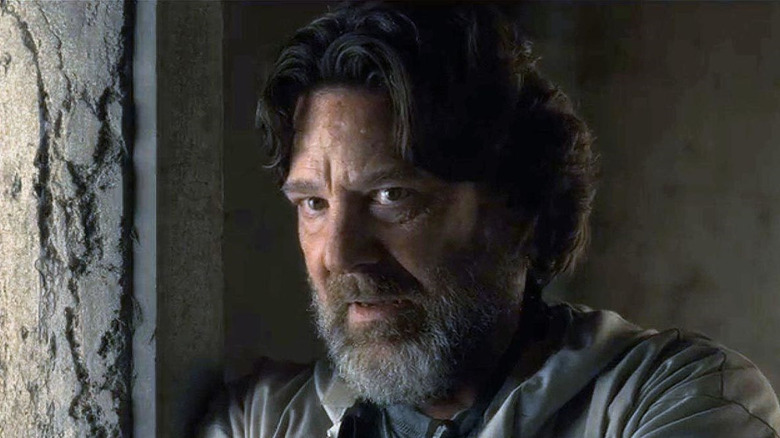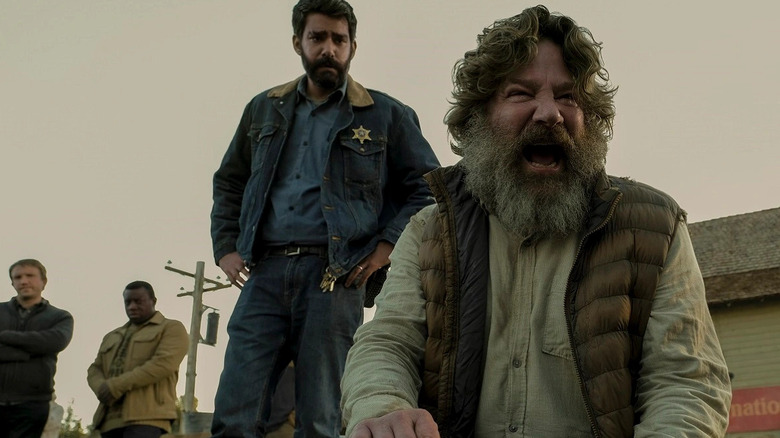Mike Flanagan Went To The Mat To Keep One Of His Favorite Haunting Of Hill House Moments Intact
Approaching "The Haunting of Hill House" like a marathon feature film, writer-director Mike Flanagan aimed to retain as much of Shirley Jackson's bestselling story as much as possible, while expanding material — the queer identity of Theodora, for example, could be more explicit than it could in 1959. But as with any Flanagan tale, every moment must justify itself and serve the greater story.
Monologues are vulnerable in the editing room due to their potential to lose viewer interest — an actor has to really sell it for an audience to sit through a two or three minute speech. The "Oculus" director doesn't seem to mind; in fact, he tells Vulture that "a monologue paints a vivid mental picture if it's done right." "Hill House" features plenty of them, but one monologue was especially worth fighting for. He tells Vulture:
"I fought hard for each of the monologues in the show, and I always shot them as single takes, usually with an imperceptible push or zoom employed to bring the viewer closer to the story — to fall into it, as it were. Sometimes I lost the battle and we'd have to put in a cutaway or two, but other times the scene survived untouched. My favorite one is in episode seven, with Mr. Dudley. Robert Longstreet hit it out of the park. The crew was riveted as we shot it, and even the grips and electricians were applauding him when he finished. Keeping that monologue intact was a hill I was determined to die on, if necessary. We're all storytellers in this business, and I personally love to sit back and watch someone tell a story. If it's done well, there's nothing like it. It's pure. But man, it puts pressure on the actor. That pressure can yield magical, one-of-a-kind moments."
Hill House horrors
"Hill House" sees Longstreet as Mr. Dudley, one of a reserved pair of caretakers who don't dare go onto the property at night — and Dudley has a monologue explaining why. He begins with a simple connection — "You know, my mother worked in this house" — and ends up telling a ghost story of his own, punctuated with a gentle suggestion to take time away from Hill House for the mental health of the increasingly erratic matriarch Olivia (Carla Gugino).
In a slow, steady rivulet of restrained emotion, Dudley runs through his grief as a father and his fears as a husband and a god-fearing man, and draws a direct line from the trauma of the home's occupants (a stillbirth, perhaps) to the property's paranormal occurrences (a baby's cries) — a pitch-perfect example of the Flanagan ethos he imparts to Vulture: "For us, the ghosts that were the most interesting were the ones that we create in ourselves, throughout our lives." The monologue is far more deliberate than a campfire ghost story; it's the wry and subtle recollections of someone who went through something heavy and inexplicable.
It tracks that Longstreet received applause after delivering Mr. Dudley's heartfelt warning; Flanagan would go on to cast his lens on him again in Stephen King adaptation and counterpart to "The Shining," "Doctor Sleep," as Barry the Chunk, and then again as Joe Collie in the 2021 supernatural miniseries "Midnight Mass." In the latter, Collie delivers several monologues over seven hour-long episodes, as a thoroughly broken man on the rocky road to forgiveness.
Perhaps in Flanagan's upcoming adaptation of Edgar Allan Poe's "The Fall of the House of Usher," his character (featured in eight episodes, according to IMDB) will have an easier go of things. Then again, no one's happy in a Poe tale.

